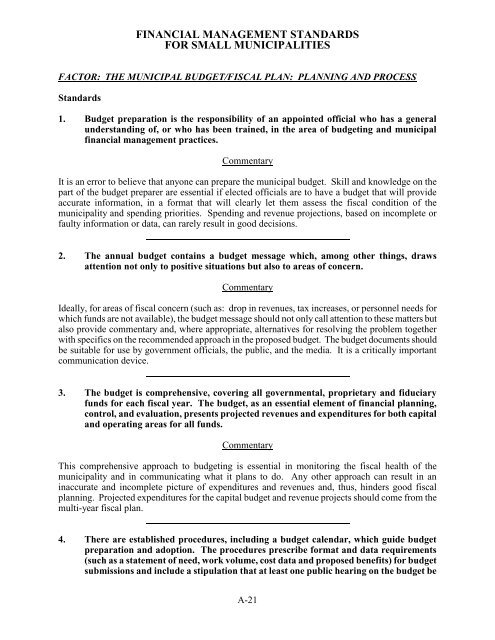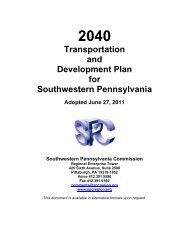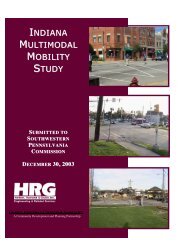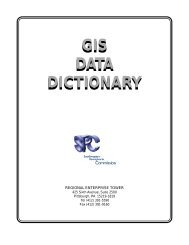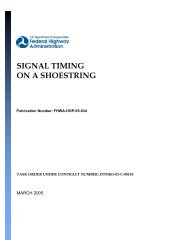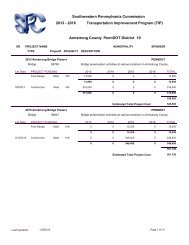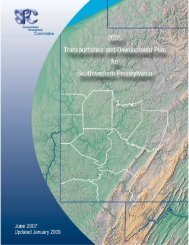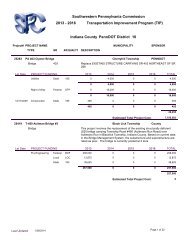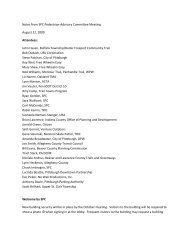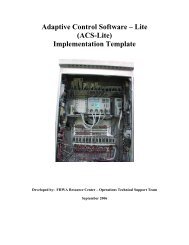- Page 1:
THE MUNICIPAL SECRETARY DESKTOP REF
- Page 4 and 5:
SOUTHWESTERN PENNSYLVANIA COMMISSIO
- Page 7 and 8:
THE MUNICIPAL SECRETARY’S DESKTOP
- Page 9 and 10:
SECTION: PAGE IX. MUNICIPAL PURCHAS
- Page 11 and 12:
SECTION: PAGE XV. RECORDS MANAGEMEN
- Page 13 and 14:
ACKNOWLEDGMENTS The Local Governmen
- Page 15 and 16:
PREFACE THE MUNICIPAL SECRETARY’S
- Page 17 and 18:
INTRODUCTION THE MUNICIPAL SECRETAR
- Page 19 and 20:
SECTION I RESPONSIBILITIES OF THE G
- Page 21 and 22:
SECTION I POLICIES TO EXPEDITE AND
- Page 23 and 24:
A. RESPONSIBILITIES OF THE MUNICIPA
- Page 25 and 26:
B. MUNICIPAL INVESTMENT POLICIES AN
- Page 27 and 28:
C. MUNICIPAL INTERNAL CONTROL POLIC
- Page 29 and 30:
D. MUNICIPAL BUDGETING Developing a
- Page 31 and 32:
E. CAPITAL IMPROVEMENT PROGRAMMING
- Page 33 and 34:
F. MUNICIPAL RISK MANAGEMENT A muni
- Page 35 and 36:
G. MUNICIPAL TRAINING PROGRAM If mu
- Page 37 and 38:
H. MUNICIPAL PURCHASING Effective a
- Page 39 and 40:
I. PERSONNEL RECORDS AND PERSONNEL
- Page 41 and 42:
J. MUNICIPAL RECORDS MANAGEMENT The
- Page 43 and 44:
K. MEETING AGENDA The adoption and
- Page 45 and 46:
MUNICIPAL HIRING POLICY For local g
- Page 47 and 48:
General Qualification - In order to
- Page 49 and 50:
___________________________ TOWNSHI
- Page 51 and 52:
service or product that a Preferred
- Page 53 and 54:
SECTION II SECRETARY'S CALENDAR REF
- Page 55 and 56:
SECTION II REPORTING CALENDAR Forew
- Page 57 and 58:
ANNUAL SECRETARY’S CALENDAR DATE
- Page 59 and 60:
SECTION III NETWORKING REFERENCES P
- Page 61 and 62:
SECTION III NETWORKING Foreword Suc
- Page 63 and 64:
PROFESSIONAL AFFILIATIONS This port
- Page 65 and 66:
PENNSYLVANIA LOCAL GOVERNMENT SECRE
- Page 67 and 68:
THE GOVERNMENT FINANCE OFFICERS ASS
- Page 69 and 70:
GOVERNMENTAL AGENCIES DIRECTORY Alt
- Page 71 and 72:
STATE AGENCIES AND OFFICES ATTORNEY
- Page 73 and 74:
STATE AGENCIES AND OFFICES (continu
- Page 75 and 76:
STATE AGENCIES AND OFFICES (continu
- Page 77 and 78:
PUBLIC EMPLOYEE RETIREMENT COMMISSI
- Page 79 and 80:
III-19 Revised May 2006
- Page 81 and 82:
District Office Contact Information
- Page 90 and 91:
III-30
- Page 92 and 93:
III-32
- Page 94 and 95:
Pennsylvania Regional Planning Comm
- Page 96 and 97:
OTHER REGIONAL ASSISTANCE (not publ
- Page 98 and 99:
DEPARTMENT OF PLANNING Advises coun
- Page 100 and 101:
III-40
- Page 102 and 103:
III-42
- Page 104 and 105:
IV-2
- Page 106 and 107:
IV-4
- Page 108 and 109:
IV-6
- Page 110 and 111:
THE PENNSYLVANIA MUNICIPAL TRAINING
- Page 112 and 113:
INTERNATIONAL CITY/COUNTY MANAGEMEN
- Page 114 and 115:
LOCAL GOVERNMENT ACADEMY The Local
- Page 116 and 117:
PENN STATE UNIVERSITY=S PENNSYLVANI
- Page 118 and 119:
CERTIFIED GOVERNMENTAL SECRETARY Th
- Page 120 and 121:
CERTIFIED BOROUGH OFFICIAL The Penn
- Page 122 and 123:
V-2
- Page 124 and 125:
V-4
- Page 126 and 127:
V-6
- Page 128 and 129:
V-8
- Page 130 and 131:
V-10
- Page 132 and 133:
V-12
- Page 134 and 135:
V-14
- Page 136 and 137:
V-16
- Page 138 and 139:
V-18
- Page 140 and 141:
V-20 Revised May 2006
- Page 142 and 143:
V-22 Revised May 2006
- Page 144 and 145:
V-24
- Page 146 and 147:
04 SUPERVISOR 04 SUPERVISOR _______
- Page 148 and 149:
DCED-CLGS-19-5 Report of Elected an
- Page 150 and 151:
V-30
- Page 152 and 153:
V-32
- Page 154 and 155:
V-34
- Page 156 and 157:
V-36 Revised July 2003
- Page 158 and 159:
V-38 Revised July 2003
- Page 160 and 161:
V-40 Revised July 2003
- Page 162 and 163:
V-42
- Page 164 and 165:
V-44 Revised July 2003
- Page 166 and 167:
V-46
- Page 168 and 169:
V-48
- Page 170 and 171:
V-50
- Page 172 and 173:
V-52
- Page 174 and 175:
V-54
- Page 176 and 177:
V-56
- Page 178 and 179:
V-58 Revised July 2003 Revised July
- Page 180 and 181:
V-60 Revised July 2003
- Page 182 and 183:
V-62
- Page 184 and 185:
V-64
- Page 186 and 187:
V-66
- Page 188 and 189:
V-68
- Page 190 and 191:
V-70
- Page 192 and 193:
V-72 Revised May 2006
- Page 194 and 195:
V-74
- Page 196 and 197:
V-76
- Page 198 and 199:
V-78
- Page 200 and 201:
V-80 Revised May 2006
- Page 202 and 203:
V-82
- Page 204 and 205:
V-84 Revised May 2006
- Page 206 and 207:
V-86 Revised May 2006
- Page 208 and 209:
VI-2
- Page 210 and 211:
VI-4
- Page 212 and 213:
VI-14
- Page 214 and 215:
VI-14
- Page 216 and 217:
VI-14
- Page 218 and 219:
VI-14
- Page 220 and 221:
VI-14
- Page 223 and 224:
SECTION VII NON-COMPETITIVE - ENTIT
- Page 225 and 226:
VII-5
- Page 227 and 228:
VII-7
- Page 229 and 230:
VII-9
- Page 231 and 232:
VII-11
- Page 233 and 234:
NOTES DEPARTMENT OF COMMUNITY AND E
- Page 235 and 236:
SECTION VIII MUNICIPAL BUDGET REFER
- Page 237 and 238:
SECTION VIII MUNICIPAL BUDGET Forew
- Page 239 and 240:
THE DO’S AND DON’TS OF MUNICIPA
- Page 241 and 242:
DO insist the real estate tax colle
- Page 243 and 244:
MUNICIPAL BUDGET CALENDAR OPERATING
- Page 245 and 246:
A BUDGET CALENDAR FOR THE SECRETARY
- Page 247 and 248:
Estimation of Revenues Factors to C
- Page 249 and 250:
CHECKLIST EXPENDITURE DATA REQUIRED
- Page 251 and 252:
VIII-17
- Page 253 and 254:
VIII-19
- Page 255 and 256:
VIII-21
- Page 257 and 258:
VIII-23
- Page 259 and 260:
Borough and Township Real Estate Ta
- Page 261 and 262:
NOTES THE ELEMENTS OF A FEE/SERVICE
- Page 263 and 264:
NOTES A FEE CHECKLIST QUESTIONS AND
- Page 265 and 266:
ANNUAL BUDGET MESSAGE The annual bu
- Page 267 and 268:
REVENUE The primary revenue source
- Page 269 and 270:
CHART OF ACCOUNTS In most municipal
- Page 271 and 272:
SECTION IX MUNICIPAL PURCHASING POL
- Page 273 and 274:
SECTION IX MUNICIPAL PURCHASING POL
- Page 275 and 276:
NOTES THE PURCHASING SEQUENCE I. Ad
- Page 277 and 278:
VII. Purchases over $10,000: User d
- Page 279 and 280:
IX-9
- Page 281 and 282:
NOTES GENERAL BID SPECIFICATIONS 1.
- Page 283 and 284:
Finally, in the event of cancellati
- Page 285 and 286:
IX-15
- Page 287 and 288:
Written/Telephonic Price Quotations
- Page 289 and 290:
IX-19
- Page 291 and 292:
OFFICIAL BID NOTICE TOWNSHIP Sealed
- Page 293 and 294:
IX-23
- Page 295 and 296:
NOTES WRITING A BID ADVERTISEMENT T
- Page 297 and 298:
NOTES CONTRACT PURCHASING STEPS Whe
- Page 299 and 300:
NOTES INTERGOVERNMENTAL PURCHASING
- Page 301 and 302:
This program, The Local Piggyback P
- Page 303 and 304:
TOTAL PRICE AND F.O.B. CONTRACTS. P
- Page 305 and 306:
IX-35
- Page 307 and 308:
LIQUID FUELS TAX FUNDS REV A Accept
- Page 309 and 310:
PennDOT's Agility Program PennDOT h
- Page 311 and 312:
IX-41 Revised May 2006
- Page 313 and 314:
SECTION X MUNICIPAL PERSONNEL MANAG
- Page 315 and 316:
SECTION X PERSONNEL MANAGEMENT Fore
- Page 317 and 318:
PERSONNEL RECORDS GENERAL Employees
- Page 319 and 320:
FAIR LABOR STANDARDS ACT The Fair L
- Page 321 and 322:
RECORDS RETENTION REQUIREMENTS Comp
- Page 323 and 324:
X-11
- Page 325 and 326:
X-13 Revised July 2003
- Page 327 and 328:
Employee: Department: RECORD OF EMP
- Page 329 and 330:
X-17
- Page 331 and 332:
X-19
- Page 333 and 334:
X-21
- Page 335 and 336:
X-23
- Page 337 and 338:
X-25
- Page 339 and 340:
Nondiscrimination Equal Opportunity
- Page 341 and 342:
Sexual Harassment Basic Policy The
- Page 343 and 344:
Sample 1 Nepotism To minimize possi
- Page 345 and 346:
Accidents must be reported without
- Page 347 and 348:
Grievances Small Municipality Proce
- Page 349 and 350:
Benefits Note: Most insurance-type
- Page 351 and 352:
Personnel Policy Compendium Drug-Fr
- Page 353 and 354:
Personnel Policy Compendium Drug-Fr
- Page 355 and 356:
Personnel Policy Compendium Drug-Fr
- Page 357 and 358:
Personnel Policy Compendium Drug-Fr
- Page 359 and 360:
X-47 Revised May 2006
- Page 361 and 362:
NEW HIRE PROCEDURE ALL EMPLOYEES: _
- Page 363 and 364:
SECTION XI MUNICIPAL INVESTMENT POL
- Page 365 and 366:
SECTION XI MUNICIPAL INVESTMENT POL
- Page 367 and 368:
THE MUNICIPAL INVESTMENT POLICY AND
- Page 369 and 370:
NOTES INVESTMENT INSTRUMENTS PERMIT
- Page 371 and 372:
A CASH FLOW ANALYSIS FOR INVESTMENT
- Page 373 and 374:
A Sample of a Municipal Cash Flow A
- Page 375 and 376:
PUBLIC INVESTMENT POOLS Pennsylvani
- Page 377 and 378:
TREASURER=S INVESTMENT POOLS There
- Page 379 and 380:
X-17
- Page 381 and 382:
X-19
- Page 383 and 384:
SECTION XII MUNICIPAL FINANCIAL MAN
- Page 385 and 386:
SECTION XII MUNICIPAL FINANCIAL MAN
- Page 387 and 388:
NOTES INTERNAL CONTROLS BASIC PRINC
- Page 389 and 390:
Sound Procedures for Authorizing, R
- Page 391 and 392:
2.3 Monitor compliance with interna
- Page 393 and 394:
10. The bank statement balance, les
- Page 395 and 396:
NOTES CREATING PETTY CASH/CHANGE FU
- Page 397 and 398:
FORM A XII-15 Revised May 2006
- Page 399 and 400:
NOTES FINANCIAL AND AUDIT REPORT Th
- Page 401 and 402:
NOTES DEPRECIATION A municipality w
- Page 403 and 404:
EXHIBIT A STRAIGHT LINE DEPRECIATIO
- Page 405 and 406:
When a jurisdiction disposes (sells
- Page 407 and 408:
Step One - Inventory Records This p
- Page 409 and 410:
XII-27
- Page 411 and 412:
XII-29
- Page 413 and 414:
NOTES FINANCIAL STATEMENTS The tota
- Page 415 and 416:
XII-33
- Page 417 and 418:
XII-35
- Page 419 and 420:
XII-37
- Page 421 and 422:
XII-39
- Page 423 and 424:
XII-41
- Page 425 and 426:
XII-43
- Page 427 and 428:
SECTION XIII MANAGING MUNICIPAL MEE
- Page 429 and 430:
SECTION XIII MEETING MANAGEMENT For
- Page 431 and 432:
MEETING AGENDA* The adoption and us
- Page 433 and 434:
A MODEL AGENDA* A common order of b
- Page 435 and 436:
BASIC MEETING PROCEDURE 1. A member
- Page 437 and 438:
MEETING DO=S AND DON=TS DO create a
- Page 439 and 440:
SAMPLE MINUTES Supervisors= Meeting
- Page 441 and 442:
XIII-15
- Page 443 and 444:
Takes place the first Monday in Jan
- Page 445 and 446:
THE SUNSHINE ACT The following sect
- Page 447 and 448:
DATE: April 12, 2005 NAME- PLEASE P
- Page 449 and 450:
DISCLOSURE OF CONFLICT OF INTEREST
- Page 451 and 452:
SECTION XIV MUNICIPAL RISK MANAGEME
- Page 453 and 454:
SECTION XIV MUNICIPAL RISK MANAGEME
- Page 455 and 456:
A Risk Management Policy for Small
- Page 457 and 458:
NOTES MUNICIPAL INSURANCE * A. GENE
- Page 459 and 460:
MUNICIPAL INSURANCE - Pennsylvania
- Page 461 and 462:
C. WORKERS= COMPENSATION Intended t
- Page 463 and 464:
H. PROPERTY INSURANCE 1. Protects a
- Page 465 and 466:
2. Deductibles a. Review annually b
- Page 467 and 468:
7. Self-insurance a. True self-insu
- Page 469 and 470:
INSURANCE REGISTER* Type of Coverag
- Page 471 and 472:
XIV-21
- Page 473 and 474:
NOTES RISK MANAGEMENT* A SAFETY CHE
- Page 475 and 476:
NOTES STEPS TO BEGIN A BASIC RISK M
- Page 477 and 478:
XIV-27
- Page 479 and 480:
Dear Township Resident: Recently we
- Page 481 and 482:
XIV-31 Revised May 2006
- Page 483 and 484:
XIV-33 Revised May 2006
- Page 485 and 486:
SECTION XV MUNICIPAL RECORDS MANAGE
- Page 487 and 488:
SECTION XV MUNICIPAL RECORDS MANAGE
- Page 489 and 490:
XV-5
- Page 491 and 492:
Records Inventory Form Inventoried
- Page 493 and 494:
NOTES CONTROLLING AND MANAGING RECO
- Page 495 and 496:
(3) Improving quality. Almost any i
- Page 497 and 498:
i ii iii iv v vi vii Elimination of
- Page 499 and 500:
XV-15
- Page 501 and 502:
CHECKLIST FILES CONTROL Problem Too
- Page 503 and 504:
CHECKLIST COPY CONTROL ____________
- Page 505 and 506:
XV-21
- Page 507 and 508:
XV-23
- Page 509 and 510:
XV-25
- Page 511 and 512:
XV-27
- Page 513 and 514:
XV-29
- Page 515 and 516:
XV-31
- Page 517 and 518:
XV-33
- Page 519 and 520:
XV-35
- Page 521 and 522:
XV-37
- Page 523 and 524:
XV-39
- Page 525 and 526:
XV-41
- Page 527 and 528:
XV-43
- Page 529 and 530:
XV-45
- Page 531 and 532:
XV-47
- Page 533 and 534:
CHAPTER S I X GENERAL FINANCIAL AND
- Page 535 and 536:
XV-51
- Page 537 and 538:
XV-53
- Page 539 and 540:
XV-55
- Page 541 and 542:
XV-57
- Page 543 and 544:
XV-59
- Page 545 and 546:
XV-61
- Page 547 and 548:
XV-63
- Page 549 and 550:
XV-65
- Page 551 and 552:
XV-67
- Page 553 and 554:
XV-69
- Page 555 and 556:
XV-71
- Page 557 and 558:
RESOLUTION NO. 21-2002 OPEN RECORDS
- Page 559 and 560:
RECORD REQUEST DATE _______________
- Page 561 and 562:
MUNICIPAL RECORDS SCHEDULE RETENTIO
- Page 563 and 564:
APPENDIX B Example of Resolution In
- Page 565 and 566:
Revised May 2006 XV-81 Revised May
- Page 567 and 568:
Page 1 of 3 ELECTRONIC RECORDS POLI
- Page 569 and 570:
Page 3 of 3 b. E-mail messages shal
- Page 571 and 572:
RECORDS MANAGEMENT GRANTS The Penns
- Page 573 and 574:
SECTION XVI PENNSYLVANIA LOCAL GOVE
- Page 575 and 576:
SECTION XVI PENNSYLVANIA LOCAL GOVE
- Page 577 and 578:
PENNSYLVANIA LOCAL GOVERNMENT 1 A B
- Page 579 and 580:
Home Rule The Pennsylvania 1874 Con
- Page 581 and 582:
The borough council, the township c
- Page 583 and 584:
The duties of the offices of solici
- Page 585 and 586:
Policy and legislative powers shoul
- Page 587 and 588:
Municipal Authorities Municipal aut
- Page 589 and 590:
As voluntary associations, members
- Page 591 and 592: XVI-19
- Page 593 and 594: XVI-21
- Page 595 and 596: XVI-23
- Page 597 and 598: XVI-25
- Page 599 and 600: NOTES Responsibilities of a Municip
- Page 601 and 602: 8. To attend all meetings of (board
- Page 603 and 604: K. To make recommendations to the c
- Page 605 and 606: SECTION XVII MUNICIPAL REFERENCE LI
- Page 607 and 608: SECTION XVII MUNICIPAL REFERENCE LI
- Page 609 and 610: Alternative Service Delivery Approa
- Page 611 and 612: Cash Management for Small Governmen
- Page 613 and 614: PERSONNEL MANAGEMENT Developing Wor
- Page 615 and 616: A Guide for Local Government: Prote
- Page 617 and 618: Also to be published in September,
- Page 619 and 620: PUBLISHING ORGANIZATIONS American A
- Page 621 and 622: PENNSYLVANIA CENTER FOR LOCAL GOVER
- Page 623 and 624: APPENDIX A STANDARDS FOR EFFECTIVE
- Page 625 and 626: STANDARDS FOR EFFECTIVE LOCAL GOVER
- Page 627 and 628: GENERAL MUNICIPAL GOVERNANCE, LEADE
- Page 629 and 630: GENERAL MUNICIPAL GOVERNANCE, LEADE
- Page 631 and 632: FACTOR: PROVIDING FOR COMPETENT MUN
- Page 633 and 634: privately, or interfere with operat
- Page 635 and 636: 8. The governing body or charter de
- Page 637 and 638: 7. For issues or problems expected
- Page 639 and 640: 6. The local governing body, manage
- Page 641: MUNICIPAL FINANCIAL MANAGEMENT STAN
- Page 645 and 646: Commentary The proposed capital spe
- Page 647 and 648: FACTOR: REVENUE COLLECTION Standard
- Page 649 and 650: FACTOR: MUNICIPAL CASH MANAGEMENT A
- Page 651 and 652: Commentary At a minimum, these cont
- Page 653 and 654: MUNICIPAL PERSONNEL MANAGEMENT STAN
- Page 655 and 656: PERSONNEL MANAGEMENT STANDARDS FOR
- Page 657 and 658: FACTOR: EMPLOYEE PRODUCTIVITY, EVAL
- Page 659 and 660: 2. The municipality has written pro
- Page 661 and 662: DEFINITIONS The following is a comp
- Page 663 and 664: the local government officials or a
- Page 665 and 666: credit ratings-Concerned with the c
- Page 667 and 668: errors and omissions-Type of insura
- Page 669 and 670: improvements-Those physical changes
- Page 671 and 672: mandamus-(writ of) An order compell
- Page 673 and 674: performance audit-An independent, t
- Page 675 and 676: esolution-A decision, opinion, poli
- Page 677 and 678: tax increment financing-A means to
- Page 679 and 680: LEGISLATIVE ACTS This information w
- Page 681 and 682: Pennsylvania Municipalities Plannin
- Page 683 and 684: ABBREVIATIONS The following are abb
- Page 685 and 686: INDEX - KEY WORDS Accident form, IV
- Page 687 and 688: Secretary, duties of, XVI 30; XVII
- Page 689 and 690: FUNCTIONAL INDEX BUDGET PROCESS Bud
- Page 691 and 692: GOVERNMENT OFFICES (continued) Dept
- Page 693 and 694:
PURCHASING PROCESS (continued) Pigg


